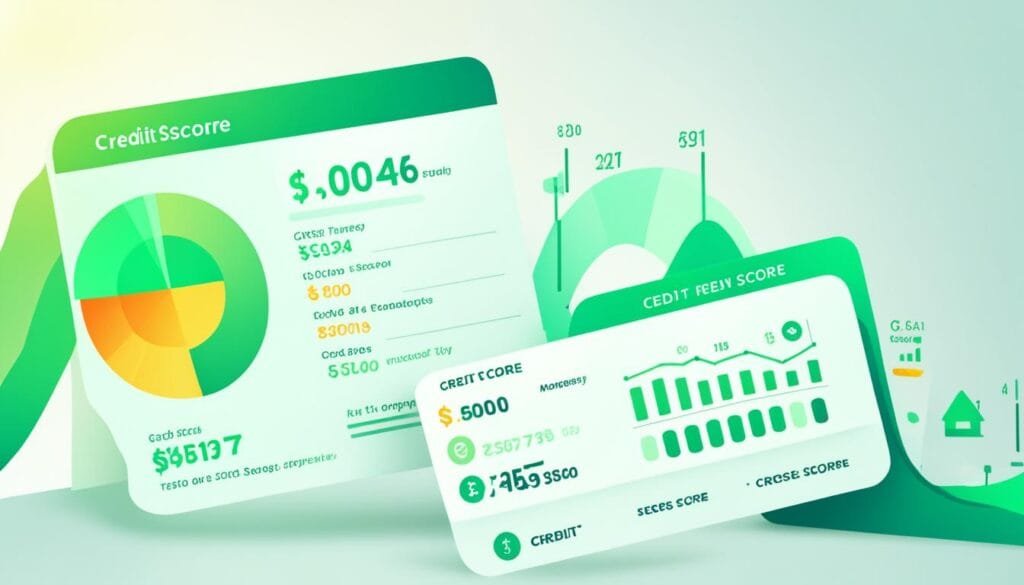Building a solid credit score is essential for financial success. Whether you’re starting from scratch or looking to improve a less-than-ideal credit score, there are strategies you can use to boost your creditworthiness. By implementing these tactics, you can improve your credit score and increase your borrowing power.
Key Takeaways:
- Improving your credit score is crucial for financial stability and increased borrowing power.
- Paying down debt and utilizing credit wisely are effective strategies for credit score improvement.
- Building and establishing good credit habits is essential for long-term creditworthiness.
- Educating yourself about how credit scores are calculated and understanding your credit reports is important.
- Improving your credit score takes time and persistence, but the results are worth it.
Strategies for Paying Down Debt and Utilizing Credit
One effective strategy for improving your credit score is to pay down your credit card balances strategically. By reducing your outstanding debts, you can decrease your credit utilization ratio, which is the amount of credit you’re using compared to your total credit limit. Keeping your credit utilization below 30% can have a significant impact on your credit score.
If you have a high credit card balance, consider creating a payment plan to systematically reduce it over time. Start by paying off your highest interest rate cards first, while making minimum payments on the others. As each card is paid off, allocate the freed-up funds towards the remaining balances. This approach helps you make progress towards debt reduction while saving on interest charges.
Another way to improve your credit score is by taking steps to increase your credit limits. Requesting higher credit limits on your existing cards or applying for new credit cards can decrease your credit utilization ratio, assuming your balances remain the same or decrease. However, use this strategy with caution to avoid taking on excessive debt.
Additionally, becoming an authorized user on someone else’s credit card account can also positively impact your credit score. When you become an authorized user, the account’s positive payment history can be added to your credit report, helping to establish a positive credit history.
Paying bills on time is another crucial factor in improving your credit score. Late payments can have a significant negative impact on your credit history and score. Setting up automatic payments or reminders can help ensure that your bills are paid on time and help establish a history of responsible financial behavior.
If you discover any errors or inaccuracies on your credit report, it’s important to dispute them promptly. Mistakes in your credit report can unfairly lower your credit score. Contact the credit reporting agencies and provide the necessary documentation to dispute any errors and have them corrected.
Implementing these strategies can help you pay down debt, optimize your credit utilization, and improve your credit score over time. By responsibly managing your credit and staying proactive, you can position yourself for better financial opportunities and a stronger credit profile.
Building and Establishing Good Credit
When working to improve your credit score, it’s important to focus on building and establishing good credit habits. By implementing the following strategies, you can take proactive steps towards improving your creditworthiness.
1. Open Accounts that Build Your Credit File
One of the key ways to build credit is by opening accounts that will be reported to the credit bureaus. This can include credit cards, loans, or lines of credit. By responsibly managing these accounts and making consistent payments, you can demonstrate your creditworthiness to lenders.
2. Pay Your Bills on Time
One of the most important factors influencing your credit score is your payment history. To maintain a positive credit score, it’s crucial to pay all bills on time. This includes credit card payments, loan installments, and any other financial obligations you may have. Set reminders or automate payments to ensure you don’t miss any due dates.
3. Catch Up on Past-Due Accounts
If you have any past-due accounts, it’s essential to catch up on payments as soon as possible. Late or missed payments can significantly impact your credit score. Contact your creditors to discuss repayment options and establish a plan to get back on track.
4. Pay Down Revolving Account Balances
Revolving accounts, such as credit cards, have a significant impact on your credit utilization rate. Aim to pay down your revolving account balances to keep your credit utilization below 30%. This will demonstrate responsible credit management and positively impact your credit score.
5. Limit New Credit Applications
While it can be tempting to apply for multiple credit accounts, making too many credit applications can negatively impact your credit score. Each application results in a hard inquiry on your credit report, which can lower your score. Limit new credit applications and only apply for credit when necessary.
By incorporating these strategies into your financial habits, you can build and establish good credit, paving the way for a stronger credit score and improved financial opportunities.

| Strategies to Build and Establish Good Credit | Benefits |
|---|---|
| Opening accounts that build your credit file | Demonstrates creditworthiness to lenders |
| Paying your bills on time | Maintains a positive payment history |
| Catching up on past-due accounts | Improves credit score by reducing delinquencies |
| Paying down revolving account balances | Lowers credit utilization rate and improves credit score |
| Limiting new credit applications | Prevents excessive hard inquiries and potential credit score drops |
Timeframe for Credit Score Improvement and Credit Education
Improving your credit score is a gradual process that can take time, depending on your individual circumstances. While some improvements may be visible quickly, rebuilding a credit score often requires several months or even longer. It’s crucial to understand the factors that impact your credit score and educate yourself on how credit scores are calculated.
One key aspect of credit education is understanding credit reports. These reports provide detailed information about your credit history, including your payment history, credit utilization, and any negative marks. By reviewing your credit reports regularly, you can identify areas for improvement and address any errors or discrepancies that may be negatively impacting your score.
Additionally, learning how credit scores are calculated can empower you to make informed decisions regarding your financial habits. Factors such as payment history, credit utilization, length of credit history, types of credit used, and new credit applications all play a role in determining your credit score. By focusing on these areas, you can take proactive steps to improve your creditworthiness.
To aid in your credit education journey, there are numerous resources available. Online credit education courses, credit counseling agencies, and financial literacy programs can provide valuable information and guidance. These resources can help you understand credit terminology, develop healthy credit habits, and learn strategies for improving your credit score.

Credit Score Improvement Timeline
| Timeframe | Actions |
|---|---|
| Immediately | Start by reviewing your credit reports from all three major credit bureaus—Equifax, Experian, and TransUnion. Look for any errors or discrepancies that can be disputed. |
| 1-2 Months | Focus on paying bills on time and reducing credit card balances to keep your credit utilization ratio low. Consider becoming an authorized user on a credit card with a positive payment history. |
| 3-6 Months | Continue making timely payments and paying down debt. Avoid opening new credit accounts unless necessary and limit credit inquiries. |
| 6+ Months | As you maintain healthy credit habits over time, your credit score should gradually improve. Consistency and patience are key to rebuilding your credit score. |
Remember, improving your credit score is a journey, and it’s important to stay committed to the process. By educating yourself on credit scores, understanding credit reports, and implementing responsible financial habits, you can take control of your creditworthiness and work towards a healthier financial future.
What Are Effective Tactics for Boosting Your Credit Score?
If you’re looking to rebuild credit score profile, start by paying bills on time and keeping credit card balances low. Regularly checking your credit report for errors and limiting new credit applications can also help improve your credit score. Additionally, consider seeking professional advice for personalized strategies.
Conclusion
Improving your credit score is a critical aspect of establishing financial stability and increasing your borrowing power. By implementing the credit score improvement strategies discussed in this article, such as paying down debt, utilizing credit wisely, and developing good credit habits, you can effectively raise your credit score and enhance your overall financial health.
Remember that credit repair takes time and patience. It’s important to remain persistent and dedicated to your credit score improvement goals. By consistently applying these credit rebuilding strategies and following credit score tips, you can gradually increase your creditworthiness and pave the way for future financial success.
Stay informed about how credit scores are calculated and regularly review your credit reports to ensure accuracy. There are various credit education resources available to help you understand the factors that influence your credit score and guide you through the credit improvement process.
FAQ
How can I improve my credit score?
There are several strategies you can use to improve your credit score. These include paying down credit card balances strategically to keep your credit utilization below 30%, asking for higher credit limits, becoming an authorized user on a credit card with a good payment history, paying bills on time, and disputing any errors on your credit report.
How long does it take to improve a credit score?
The timeframe for improving a credit score can vary depending on individual circumstances. While some improvements can be seen quickly, rebuilding a credit score may take several months or longer. It’s important to educate yourself on how credit scores are calculated and the factors that contribute to your score.
What are some good credit-building habits?
To build good credit, it’s important to establish positive habits such as opening accounts that will be reported to the credit bureaus, paying all bills on time, catching up on any past-due accounts, paying down revolving account balances, and limiting the number of new credit applications you make to avoid excessive inquiries.
Where can I find resources to help me understand credit improvement?
There are resources available to help you navigate the credit improvement process and gain a better understanding of your credit reports. You can consult financial education websites, credit counseling organizations, and credit monitoring services for guidance and information on improving your credit score.

